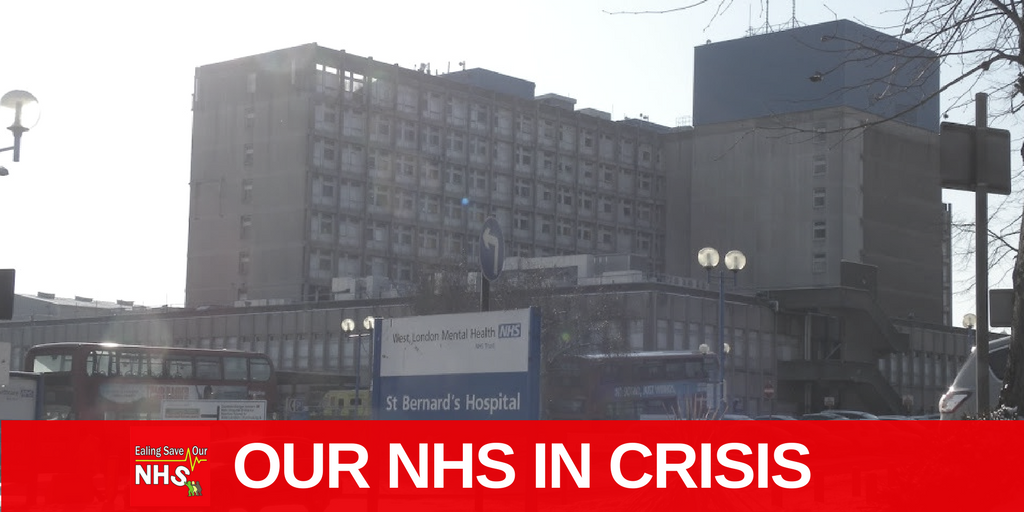Issue: 14
June 2014
This occasional newsletter is researched, written and edited by a group of concerned residents in Ealing, West London who want to preserve our NHS. We view the wholesale engagement of private, for-profit healthcare service suppliers as unnecessary, profligate and dangerous. Process improvement is what is needed in our NHS – not revolution.
The Vulnerable
The true test of any healthcare/social care system is how successful it is in treating and caring for the vulnerable. The vulnerable in our society include the mentally and physically ill and disabled, the frail and elderly, the poor, the uneducated, the homeless, the friendless, those living alone and the very young. This is a growing group as, for example, people are living longer and more people are presenting with mental health problems.
So what recent Government initiatives punish the vulnerable? Well…here’s a few:
+ Reducing the annual spend per head on our State healthcare will put us below 10th in the world (where we stand now)
+ Reducing the number of hospital beds has now placed us below France, Germany and even Eastern European countries in hospital beds /1,000 people
+ Reducing the budgets for the care of the mentally ill
+ 5,000,000 children could be living in poverty in the UK by 2020 (Save The Children)
+ The ‘bedroom tax’
+ Closure of A&E units
+ Closure of Maternity and Paediatric units
+ Demolishing major hospitals and using them the sites for new homes, none of which are Social Homes for Rent
+ Destroying the clinically based NHS Direct telephone advice service and substituting a non-clinically based call centre service
+ Privatising the provision of State healthcare services resulting in NHS services being provided by companies and staff mandated to make a profit for shareholders rather to make patients better.
EALING HOSPITAL FUTURES
Now is a good time to review the unique, revolutionary changes mandated in the NHS North West London ‘Shaping a Healthier Future’ (SaHF). The 2012 proposals were effectively fully given the green light when the London Borough of Ealing’s Judicial Review of Ealing Hospital closures failed in November 2013. According to the 2012 proposals, SaHF implementation will take ‘at least three years’. That takes us to December 2016. However SaHF fans were no doubt convinced they would win against any legal challenge and will have been working on all the changes since February 2013 – so closure of all four A&Es at Central Middlesex, Ealing, Hammersmith and Charing Cross Hospitals could be much sooner than 2016. However Jeremy Hunt MP said in October 2013 said that Central Middlesex and Hammersmith Hospitals’ A&Es should close ‘as soon as possible’.
What is clearly the future for the Ealing Hospital site is what is happening this year on the adjacent St Bernard’s Hospital land – demolition and new build. The new three ward medical building to be built on the Ealing Hospital site sounds like a Cottage Hospital. It will be rather like a private hospital or even a hotel in some ways as each bed will be in its own room. There will be 82 beds – none of them acute – and the patients will be pre- or post-op patients who will be operated on or have been operated on elsewhere. The medical staff will be GPs and nurses. Diagnostic services will also be provided, no doubt by a private supplier like InHealth. As private healthcare company Circle currently runs the Urgent Care Centre on the site they must be favourite to run the new Cottage Hospital.
Ealing Hospital’s Maternity will be the first service to be destroyed. Sometime during the next nine months no more babies will be born at Ealing Hospital. A lot is being expected of Queen Charlotte’s Hospital Maternity Unit in Hammersmith and Northwick Park Hospital Maternity Unit in Harrow to handle the Ealing workload, which in 2013/14 numbered 2,915 births. A lot is being asked of vulnerable, poor Ealing mothers getting easy access to continuity of care in Hammersmith or Harrow before, during and after their child’s birth.
The General Election on 7 May 2015 could play a crucial part in what happens next. Many Labour Party fans want Labour to campaign on stopping this revolution in the NHS and getting funding levels and funding increases back to pre-Coalition Government levels. This would of course mean cutting budget proposals elsewhere and upsetting those Labour MPs who have financial interests in private healthcare companies. The re-election of the three Ealing MPs (should they all stand for re-election) may to some extent depend on the NHS question.
Ealing Clinical Commissioning Group (ECCG) in Public Open Warfare with Ealing Hospital NHS Trust (EHT)
When I ran my own business I was never at war with my major suppliers. ECCG is seemingly at war with EHT, its historic major service supplier. ECCG claims EHT offers a poor and expensive cardiology service for example. But EHT says after a recent unplanned Care Quality Commission (CQC) visit to EHT all its services got favourable reports. (In fact CQC’s main criticism of EHT was similar to its criticism of ECCG i.e. one of inadequate complaint reporting). ECCG is also claiming failures by EHT uncovered by CQC in ‘patient pathways’. This public bickering between our local service purchaser and our major local service supplier is unseemly and a gross waste of time and money.
NHS NW London Spent Over £10 Million on Management Consultants in 2013/14 and £3.3 Million of it with McKinsey & Company on ‘Whole Systems Integrated Care’
Why oh why is so much public money being lavished on management consultants by our regional NHS organisation? The eight CCGs in NHS NW London employ some 600 staff. Its Commissioning Support Unit (CSU) employs 432 staff. NHS England employs 6,100 staff. There must be a veritable army of accountants employed in these three organisations. Aren’t any of these folks capable of, for example, implementing SaHF or creating business cases or articulating ‘Primary Care Investment Principles’?
But the biggest regional NHS financial car crash concerns ‘integrated care’. NHS NW London spent £3,355,621 with McKinsey & Company on this topic in 2013/14 and the Government (see below) has just delayed (pulled the plug on?) spending the £3.8 billion on the Better Care Fund to implement this ‘integrated care’. What a shambles.
‘Whole Systems Integrated Care’ Approach In Tatters as Government Delays Launching its £3.8 Billion Better Care Fund (BCF)
With just 12 months to go before its introduction, the Government’s grandiose dream of saving money, reducing pressures on hospitals and helping to keep us all healthier in our own homes by integrating health care with social care is turning into a nightmare. The Government’s £3.8 billon Better Care Fund – the vehicle for this ‘integrated care’ – was due to be formally launched on 30 April 2014. The launch never happened and on 7 May 2014 press reports revealed the reason for this. A Government Cabinet Office report now exists which allegedly says the plans lack financial credibility and there is no detail at all as to how savings would be delivered. I’m sure many of us who questioned this very same lack of detail in SaHF will be variously vindicated and furious about this ‘Emperor’s New Clothes’ charade.
One of the cornerstones of BCF was to be the successful interworking between the NHS, Department of Health (DoH) and the hundreds of Local Authorities in England. It is of course the latter who deliver local social care services and the former two who variously deliver local health care services. All three institutions are going through endless organisational changes and financial gyrations. Local Authorities have recently suffered significant budget cuts with the worst of these due in 2015/16. The DoH was slimmed down in 2013. Our own local NHS Ealing CCG has, in its short life, got married to three other CCGs in Spring 2013 and then divorced them and got into bed with three others in December 2013! Our local hospital (EHT) is clearly going to be demolished as is our local mental health hospital (St Bernard’s). Also involved in the mix is the Local Government Association. A meeting of all these parties took place on 19 May 2014. HSJ magazine remarked that the DoH was planning tougher tests for the BCF. A 15% reduction in emergency activity is apparently expected by NHS England on implementation of the BCF.
Health care is under-funded, undergoing massive service delivery changes and staff are under enormous pressure. Social care is also under funded, much of it in crisis and staff are also under-trained, under-paid and under enormous pressure. Attempting to integrate two dysfunctional services in the hope that some kind of merger and changes to ‘settings of care’ would or will produce a single, efficient integrated care system is fanciful at best and idiotic at worst. Next year Clinical Commissioning Groups throughout England will have to hand over £2 billion to BCF. This money will be used for ‘joint commissioning of out-of-hospital and social care’ (whatever that actually means). The best estimate of when the latest ‘plan of plans’ will be approved is September 2014.
The NHS Trust Development Authority (TDA) – a provider of leadership and support for NHS hospitals – has ‘major concerns’ about BCF because hospitals have not been properly consulted about it. The King’s Fund – a charity formed in 1897 working to improve health and healthcare in England – thinks the financial case for BCF is ‘hopeless’. MHP Health has also done research that suggests that money that might be given to Local Authorities might well not be spent on BCF purposes like finding better ways to join up NHS healthcare with Local Authority social care – but will be spent on propping up existing services.
This major set back is a real embarrassment for two Secretaries of State who publicly backed this initiative – Jeremy Hunt MP and Eric Pickles MP.
NHS Choose and Book Appointments System to be Scrapped
IT failures are legion in the NHS. Choose and Book, which has cost £356 million since 2004, is being quietly ditched by the NHS. It appears that not enough GPs use it to justify its survival. The DoH and NHS England are expansively talking about introducing a new ‘e-refferal’ system available on ‘mobile apps’ sometime in 2016. Its development cost is unknown, but is likely not to be cheap.
The NHS Mental Health Service is Failing Children – and it is Getting Worse
NHS England recently revealed that only a quarter of children with mental health conditions are receiving the treatment that they need. It also admitted that there is just one mental health specialist per 30,000 young people under 20 in England. This compares badly with other countries. It’s one per 5,300 in Switzerland, one per 6,000 in Finland and one per 7,500 in France. The mental health charity YoungMinds (www.youngminds.org.uk) recently published a report in which it found that two-thirds of Local Authorities had cut their budgets for young people’s mental health. YoungMinds says that 850,000 children and young people in the UK have been diagnosed with mental health problems. But is this just the tip of the iceberg?
The Association of Educational Psychologists (AEP) says that one child in ten has a mental health problem. With over 11 million under 16 years olds in England that means over one million children in England have a mental health problem. According to AEP three quarters of these young sufferers never receive any treatment or support. The Children’s and Adolescent Mental Health Service (CAMHS) claims that the reduction in prevention and early intervention budgets is denying young people early help. Children are having to travel hundreds of miles for treatment and are regularly and inappropriately being admitted to adult psychiatric wards.
Norman Lamb, the Minister for Care and Support, claims that investing £54 million in children and young people’s mental health will improve matters. Even if the money were spent wisely it’s just a drop in the ocean of funding that is actually needed.
Paediatric Services and Infant Mortality
Mortality and morbidity of children in England and Wales are significantly higher than in Scandinavian countries. Part of the problem is lack of GP training. To rectify this, a training programme was put forward, but rejected as too expensive. With the reorganisation of the NHS, the Royal College of Paediatrics & Child Health has proposed that there should be fewer in-patient sites, but the number of Consultants should be increased by 66% as well as an increase in advanced children’s nurse practitioners and GPs trained in Paediatrics. So far NHS North West London CCGs have acknowledged this deficit but have yet to train or employ staff.
A recent confidential enquiry by the Royal College of Physicians reported in the British Medical Journal (10 May 2014) found that two thirds of asthma deaths could have been prevented, with primary care failing in the routine care of 70% of the deaths studied. 28 of the 195 deaths were of individuals under 20 years of age. This investigation underlines the urgent need to improve training of practitioners and also recruitment and training of advanced children’s nurse practitioners. With devolvement of more care to GPs, all General Practices should include at least one member who has been trained in the care of children and employ an advanced children’s practitioner. There should be a network where GPs and advanced children’s practitioners have a working relationship and continuing training with a group of Consultant Paediatricians. If this is no put in place, our child mortality is likely to rise rather than fall.
Clara Lowy
NHS NW London CCGs Have Apparently Given their Commissioning Support Unit (CSU) Marching Orders
But marching into the arms of themselves! In the Merry Go Round that is the NHS some of the 432 folks now working for the NHS NW London CSU (who offer outsourced support to the NHS NW London CCGs) will now transfer to the NHS NW London CCGs to work in-house. The decision was apparently made in early May because it would save the CCGs £5 million by 2015/16. NW London CSU now intends to merge with South London and Kent and Medway CSUs. And according to healthcare consultant Roy Lilley, CSUs are trying to consolidate their place in the market might offer their services to schools, police and prisons. Sounds a bit desperate to me……




